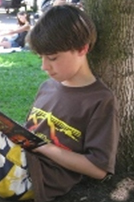Summertime has come and the kids need a break. They need to run and play and swim. They need to forget about homework.
You’re right, they do. But what they don’t need is several months without any reading practice. Teachers know that kids who don’t read over the entire summer take giant steps backward in their abilities. They forget sight words and sounds. They can’t remember what to do when they get stuck and even worse, they fail to hang on to the fluency they gained over the past school year.
Reading is so key to all of learning, that it’s the single most important skill to practice regularly. And it doesn’t have to be only independent reading, it can also be family read alouds, listening to good books, writing and reading their own stories and attending library story hours.
There are not enough “shoulds” to convey how important it is for your child to practice reading over the summer holidays. And here’s why:
Emergent Readers
Emergent readers are Kindergarten through second or third grade readers who are still learning the basics of all those squiggles and shapes. They sound words carefully and often get stuck. They’re ready for simple sentences, but may forget the sound of the letter y or w. They use their finger to follow along and need reminders to re-read or try again when they make a mistake. They’ve got a lot of reading skills in place, but they’re not there yet. Their skills are fragile.
These little readers will forget much of what they’ve learned if they don’t practice during the summer break. They’ll probably go back to school in the fall and need to begin from scratch. The difficult truth about emergent readers is, they can easily lose confidence.
Don’t let that happen. Ten to fifteen minutes of daily oral reading practice plus some fun story times together will do the trick. Not only will they keep their hard-won skills in place, they’ll continue to grow and be ready for further challenges next fall.
Average Readers
These kiddos have made good progress throughout the school year, but are not yet independent readers. Their fluency is up and down. They may need reminders to ask themselves questions as they read to maintain the meaning of the words. They’ll tend to focus word by word rather than read smoothly through sentences. They have limited vocabulary, but are able to read easy books independently.
These kids need to read books they know well for fluency and also tackle some harder books that are high in interest. They’ll benefit from both independent practice and some side by side help to encourage good reading strategies such as rereading for meaning, trying something else if the words don’t make sense, and thinking about such story elements as beginning, middle and end, characters and plot.
These readers will definitely lose ground if they don’t read during the summer. But with just fifteen to twenty minutes of daily reading, they’ll both keep the skills they’ve already learned and may even make some progress on their own.
Choosing high interest books is very important for average readers. Remember that comic books, magazine articles, and even reading instructions for putting together model airplanes count as reading. Be creative and find reading materials that motivate your average reader. You’ll be glad you did.
Fluent Readers
It’s tempting to think that fluent readers don’t need to practice their reading skills over the summer. After all, they’re cruising. But think of the learning opportunities they’ll miss if they don’t find good books to read all summer.
In addition, studies have shown that vocabulary is the single best predictor of success in higher learning and reading is the best possible way to grow vocabulary knowledge. Even fluent readers need to keep honing their skills and may need to branch out into new genres such as biographies, poetry, science fiction, or topical non-fiction books to broaden their reading abilities.
Great thinkers are good readers. Independent learners need excellent reading skills to take off on their own projects. Find some lists of excellent reading in various genres. Encourage your fluent reader to both read and extend knowledge through art projects or other creative activities. Guide them to select quality literature. Reading is the foundation for excellence in academic performance.
Be Intentional
You’ll find more success in incorporating reading into your summer schedule if you’re intentional about it. Set a time of day for a reading break and stick to it as much as possible. Make trips to the library part of your summer outings. Take advantage of your local bookstore’s summer reading program or their read-aloud times.
You might enjoy having a family summer reading challenge to encourage reading a certain number of pages or books. Be sure to offer a motivating prize when your reader meets his or her goals.
Check out great reading websites such as pbs.org, ala.org (American Library Association) or look up your child’s favorite author websites. Jan Brett, Kevin Henkes, and Jon Scieszka have wonderful sites to encourage reading.
Happy Summer Reading!




 The Exploits of Edna and Gertie Join the fun, get your copy now!
The Exploits of Edna and Gertie Join the fun, get your copy now!
Very insightful and encouraging to parents, grandparents and all caring adults. Love the idea of a family-scheduled reading time. I remember doing this with my Mom, who was an avid reader, which led to my own love of reading and love of books! When she would sit down to read every afternoon, I would run and get my book – wanted to be just like her! Thanks Jan. I’m sending this article out to many, including my friend who heads up the Children’s program at our library – hoping she’ll pass out copies. ❤️
Thank you, Chrissie. And if any of them know of struggling readers direct them to Homegrown Readers: Simple Ways to Help Your child Learn to Read on Amazon. https://amzn.to/2w3wjoa.
I read, but no one read to me. My kids were read to and read, my grandkids were read to and read, but the only reading I’ve seen my great grandson do is flipping through books on the floor. He’s only 13 months old!
None of us was forced (school excepted) to read nor were we scheduled to read. However, we were encouraged to read.
I’ve read Homegrown Readers and know it would have helped me deal with some of my low reading students when I taught subjects (even math) that required reading in middle school. My print copy was given to a mother whose child was struggling, We’ve lost contact so I don’t know how that turned out.